Story of the Week... Analysis of the Week... Toon of the Week... SkS in the News... Coming Soon on SkS... Climate Feedback Reviews... SkS Week in Review... Poster of the Week...
Story of the Week...
Climate Forecast: World Is “Sleepwalking into Catastrophe”
In an annual World Economic Forum report, climate change, extreme weather and biodiversity loss were named among the highest global risks
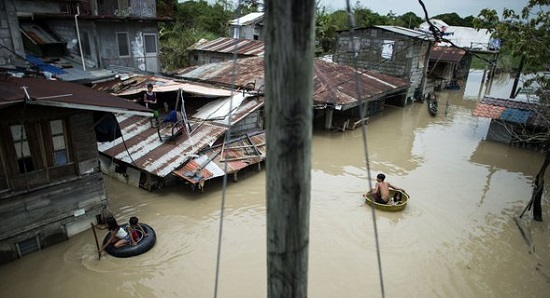
Children use basins to cross a flooded street in the aftermath of Typhoon Mangkhut in Calumpit, Philippines on September 16, 2018. Credit: Noel Celis Getty Images
Climate change is the biggest threat to the planet, the World Economic Forum said yesterday in a sweeping catalog of global risks.
The institution’s annual analysis of economic dangers worldwide named extreme weather, natural disasters, man-made environmental disasters, biodiversity loss and failure to adapt to climate change as the chief perils to society.
Of all the risks to the globe, “it is in relation to the environment that the world is most clearly sleepwalking into catastrophe,” the WEF said in its Global Risks Report. “The results of climate inaction are becoming increasingly clear.”
Climate Forecast: World Is “Sleepwalking into Catastrophe” by Anne C Mulkern, E&E News/Scientific American, Jan 17, 2019
Analysis of the Week...
Climate Change’s Giant Impact on the Economy: 4 Key Issues
Many of the big economic questions in coming decades will come down to just how extreme the weather will be, and how to value the future versus the present.
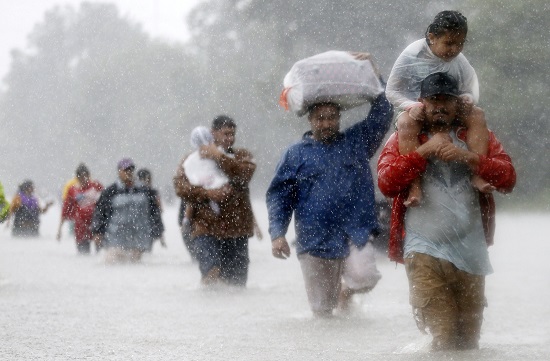
Wading through flood waters from Tropical Storm Harvey in Houston in August 2017. “We know we can adapt to slow changes,” a Yale economist said. “Rapid changes are the ones that would be most damaging and painful.” Credit: Jonathan Bachman/Reuters
By now, it’s clear that climate change poses environmental risks beyond anything seen in the modern age. But we’re only starting to come to grips with the potential economic effects.
Using increasingly sophisticated modeling, researchers are calculating how each tenth of a degree of global warming is likely to play out in economic terms. Their projections carry large bands of uncertainty, because of the vagaries of human behavior and the remaining questions about how quickly the planet will respond to the buildup of greenhouse gases.
A government report in November raised the prospect that a warmer planet could mean a big hit to G.D.P. in the coming decades.
And on Thursday, some of the world’s most influential economists called for a tax on carbon emissions in the United States, saying climate change demands “immediate national action.” The last four people to lead the Federal Reserve, 15 former leaders of the White House Council of Economic Advisers, and 27 Nobel laureates signed a letter endorsing a gradually rising carbon tax whose proceeds would be distributed to consumers as “carbon dividends.”
The Trump administration has long rejected prescriptions like a carbon tax. But policy debates aside, many of the central economic questions of the decades ahead are, at their core, going to be climate questions. These are some of the big ones.
Climate Change ’s Giant Impact on the Economy: 4 Key Issues by Neil Irwin, Upshot, New York Times, Jan 17, 2019
Toon of the Week...
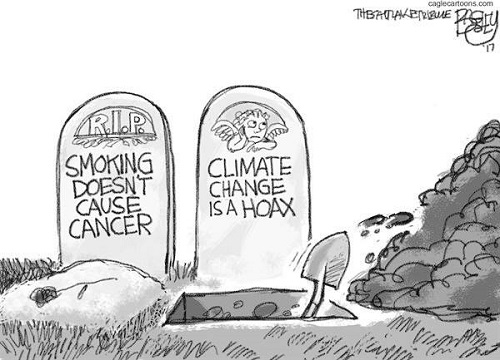
Hat tip to Stop Climate Science Denial Facebook page.
SkS in the News...
The second part of Graham Readfearn's article, Climate Advocates Underestimate Power of Fossil Fueled Misinformation Campaigns, Say Top Researchers (DeSmog, Jan 18, 2019) focuses on Inoculation. It begins with:
In addition, the researchers suggest using an emerging communications technique known as “inoculation” in which the public and policymakers are made aware of key misinformation techniques as myths are being busted.
The link embedded in the above is to the article, Inoculation Theory: Using Misinformation to Fight Misinformation by John Cook (DeSmog, July 15, 2017).
Coming Soon on SkS...
[To be added.]
Climate Feedback Reviews...
USA Today story updates readers on trend in monthly global temperatures
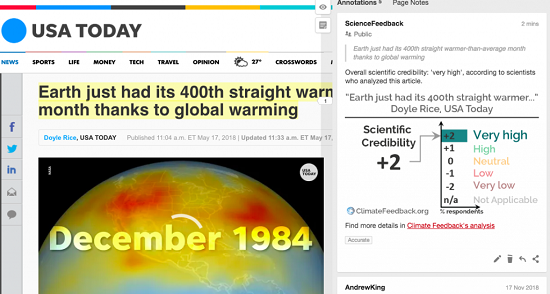
Climate Feedback asked a team of scientists to review the article, Earth just had its 400th straight warmer-than-average month thanks to global warming by Doyle Rice, USA Today, May 17, 2018
Review Summary
This article in USA Today notes that April 2018 was the 400th straight month that global temperatures were above the 20th century average, and correctly identifies human activities as the cause of this trend. It also highlights several regions that saw record-high April temperatures.
Scientists who reviewed the article found that it accurately described these facts and clearly explained how above-average months are calculated.
This is part of a series of reviews of 2018’s most popular climate stories on social media.
USA Today story updates readers on trend in monthly global temperatures by Scott Johnson, climate Feedback, Jan 14, 2019
SkS Week in Review...
- 2019 SkS Weekly Climate Change & Global Warming News Roundup #3 by John Hartz
- New research, January 7-13, 2019 by Ari Jokimäki
- Our oceans broke heat records in 2018 and the consequences are catastrophic by John Abraham (Climate Consensus - the 97%, Environment, Guardian)
- Book Review: Saudi America by gws
- New findings on ocean warming: 5 questions answered by Scott Denning (The Conversation US)
- Observations and models agree that the oceans are warming faster by Zeke Hausfather (Carbon Brief)
- 2019 SkS Weekly Climate Change & Global Warming Digest #2 by John Hartz
Poster of the Week...
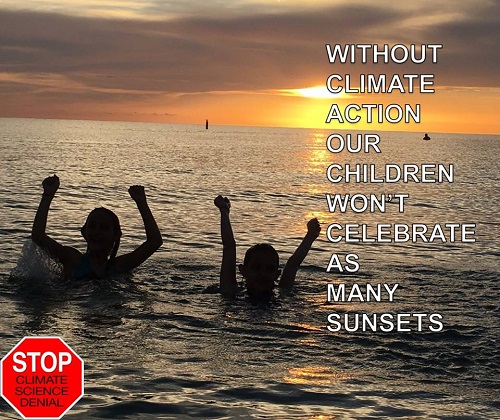
from Skeptical Science http://bit.ly/2MnHNKp
Story of the Week... Analysis of the Week... Toon of the Week... SkS in the News... Coming Soon on SkS... Climate Feedback Reviews... SkS Week in Review... Poster of the Week...
Story of the Week...
Climate Forecast: World Is “Sleepwalking into Catastrophe”
In an annual World Economic Forum report, climate change, extreme weather and biodiversity loss were named among the highest global risks

Children use basins to cross a flooded street in the aftermath of Typhoon Mangkhut in Calumpit, Philippines on September 16, 2018. Credit: Noel Celis Getty Images
Climate change is the biggest threat to the planet, the World Economic Forum said yesterday in a sweeping catalog of global risks.
The institution’s annual analysis of economic dangers worldwide named extreme weather, natural disasters, man-made environmental disasters, biodiversity loss and failure to adapt to climate change as the chief perils to society.
Of all the risks to the globe, “it is in relation to the environment that the world is most clearly sleepwalking into catastrophe,” the WEF said in its Global Risks Report. “The results of climate inaction are becoming increasingly clear.”
Climate Forecast: World Is “Sleepwalking into Catastrophe” by Anne C Mulkern, E&E News/Scientific American, Jan 17, 2019
Analysis of the Week...
Climate Change’s Giant Impact on the Economy: 4 Key Issues
Many of the big economic questions in coming decades will come down to just how extreme the weather will be, and how to value the future versus the present.

Wading through flood waters from Tropical Storm Harvey in Houston in August 2017. “We know we can adapt to slow changes,” a Yale economist said. “Rapid changes are the ones that would be most damaging and painful.” Credit: Jonathan Bachman/Reuters
By now, it’s clear that climate change poses environmental risks beyond anything seen in the modern age. But we’re only starting to come to grips with the potential economic effects.
Using increasingly sophisticated modeling, researchers are calculating how each tenth of a degree of global warming is likely to play out in economic terms. Their projections carry large bands of uncertainty, because of the vagaries of human behavior and the remaining questions about how quickly the planet will respond to the buildup of greenhouse gases.
A government report in November raised the prospect that a warmer planet could mean a big hit to G.D.P. in the coming decades.
And on Thursday, some of the world’s most influential economists called for a tax on carbon emissions in the United States, saying climate change demands “immediate national action.” The last four people to lead the Federal Reserve, 15 former leaders of the White House Council of Economic Advisers, and 27 Nobel laureates signed a letter endorsing a gradually rising carbon tax whose proceeds would be distributed to consumers as “carbon dividends.”
The Trump administration has long rejected prescriptions like a carbon tax. But policy debates aside, many of the central economic questions of the decades ahead are, at their core, going to be climate questions. These are some of the big ones.
Climate Change ’s Giant Impact on the Economy: 4 Key Issues by Neil Irwin, Upshot, New York Times, Jan 17, 2019
Toon of the Week...

Hat tip to Stop Climate Science Denial Facebook page.
SkS in the News...
The second part of Graham Readfearn's article, Climate Advocates Underestimate Power of Fossil Fueled Misinformation Campaigns, Say Top Researchers (DeSmog, Jan 18, 2019) focuses on Inoculation. It begins with:
In addition, the researchers suggest using an emerging communications technique known as “inoculation” in which the public and policymakers are made aware of key misinformation techniques as myths are being busted.
The link embedded in the above is to the article, Inoculation Theory: Using Misinformation to Fight Misinformation by John Cook (DeSmog, July 15, 2017).
Coming Soon on SkS...
[To be added.]
Climate Feedback Reviews...
USA Today story updates readers on trend in monthly global temperatures

Climate Feedback asked a team of scientists to review the article, Earth just had its 400th straight warmer-than-average month thanks to global warming by Doyle Rice, USA Today, May 17, 2018
Review Summary
This article in USA Today notes that April 2018 was the 400th straight month that global temperatures were above the 20th century average, and correctly identifies human activities as the cause of this trend. It also highlights several regions that saw record-high April temperatures.
Scientists who reviewed the article found that it accurately described these facts and clearly explained how above-average months are calculated.
This is part of a series of reviews of 2018’s most popular climate stories on social media.
USA Today story updates readers on trend in monthly global temperatures by Scott Johnson, climate Feedback, Jan 14, 2019
SkS Week in Review...
- 2019 SkS Weekly Climate Change & Global Warming News Roundup #3 by John Hartz
- New research, January 7-13, 2019 by Ari Jokimäki
- Our oceans broke heat records in 2018 and the consequences are catastrophic by John Abraham (Climate Consensus - the 97%, Environment, Guardian)
- Book Review: Saudi America by gws
- New findings on ocean warming: 5 questions answered by Scott Denning (The Conversation US)
- Observations and models agree that the oceans are warming faster by Zeke Hausfather (Carbon Brief)
- 2019 SkS Weekly Climate Change & Global Warming Digest #2 by John Hartz
Poster of the Week...

from Skeptical Science http://bit.ly/2MnHNKp

Aucun commentaire:
Enregistrer un commentaire